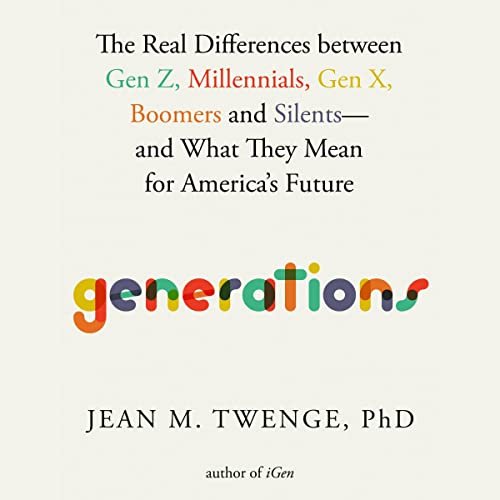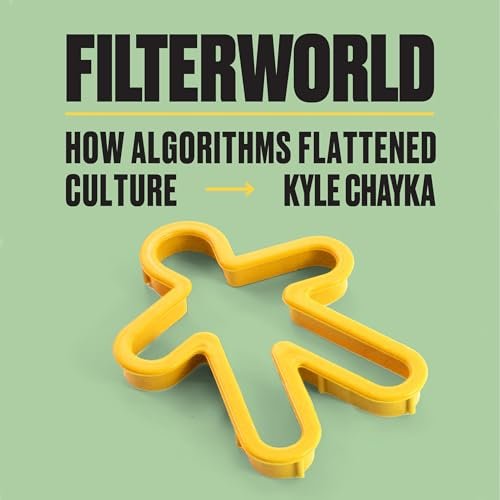Generations: The Real Differences Between Gen Z, Millennials, Gen X, Boomers, and Silents—and What They Mean for America’s Future
Jean M. Twenge’s “Generations” is an in-depth examination of the several living generations in the United States, examining how their unique experiences have impacted their views, habits, and the greater American society. Twenge, a psychology professor at San Diego State University, is well-known for her vast study on cultural shifts over generations in the United States. The book is more than just a statistic collection; it is also a narrative of America’s development as seen through the eyes of its generations, from the Silent Generation to the Polars.
The book has garnered favorable reviews, with reviewers praising Twenge’s comprehensive approach to analyzing generational implications. It has been praised for its length (515 pages before the appendix) and for being both informative and perceptive, notably on how technology improvements have resulted in “accelerating individualism” and changes in the developmental trajectory of younger Americans.

Twenge responds to concerns about categorizing individuals into generations, claiming that generational inclinations are impacted by elements such as macroeconomics, technology, and demographics. The necessity of recognizing generational disparities is emphasized throughout the book, since they are affected by external, objective variables such as historical events, economic upheavals, and technology. Twenge’s study emphasizes how varied cultural experiences, which frequently change swiftly, shape what makes each generation distinct.
The book examines the significant changes that have occurred in American culture over the previous century, with an emphasis on three major areas of cultural transformation: technology, family life, and mental health. Twenge demonstrates how technology has been both a symbol and a basic shaper of social life, linking technological advancements with modifications in attitudes and actions. The book investigates the influence of mass media, the sexual revolution, individual rights, and the consequences of more advanced communication technologies on future generations.

Twenge also analyzes monetary affluence and individualism, demonstrating how they have impacted life choices among Millennials and following generations, such as delayed marriage and motherhood. She emphasizes how economic and philosophical dimensions of cultural development interact to influence birth rates and parenting methods.
The deterioration in mental and emotional health among younger Americans, particularly Millennials and Generation Z, is a major worry expressed in the book. Twenge cites the growth of major mental health problems as a result of the rising popularity of cellphones and the internet, as well as how these technologies, combined with the empowering of individuality, have impacted wellbeing.
Twenge’s study provides a complete assessment of the six living generations in the United States:
The Silents (born 1925-1945)
This generation, defined by their devotion to domestic life and political involvement, was affected by innovations like as home appliances and radio, as well as key events such as the Great Depression and World War II.
The Boomers (born 1946-1964)
This generation underwent enormous cultural upheavals as a result of growing up with television and experiencing the Cold War and Sexual Revolution, including the embracing of gender equality and more open attitudes on sexuality.
Gen X (born 1965-1979)
As the first generation to have access to the internet, Generation X enjoyed a hybrid of analog and digital experiences. They are recognized for their cynicism and resilience, which were impacted by the growth of divorce throughout their upbringing, as well as tremendous technical and societal advancements.
Millennials (born 1980-1994)
This generation witnessed the emergence of cell phones and social media as a result of their positive upbringing and the influence of events such as 9/11. Millennials are known for deferring conventional milestones such as marriage and favoring individuality.
Generation Z (born 1995-2012)
Gen Z grew up in a post-9/11 world dominated by the internet and cell phones, seeing big events such as COVID-19. This generation is distinguished by the persistence of the slow-life approach as well as a strong dedication to individuality and self-expression.
Polars (born 2013-2029)
This generation, which is still in its formative years, is predicted to be strongly affected by the internet and AI technology. According to Twenge, they may confront greater technological limits, grow up more slowly, and be more educated than prior generations.
Twenge closes her book with future predictions, predicting difficulties in regulating technology’s influence on child development and societal cohesiveness. She sees more distant employment, increased generational strife, and a further retreat of religion in American society. Her observations show that there is an urgent need to discover methods for technology to unite rather than separate.
Sources: Literary Club, The GospolCoalistion






